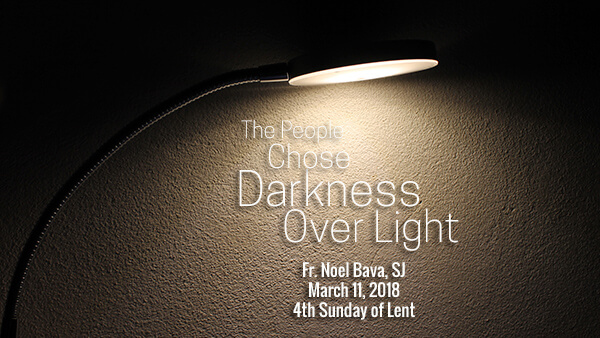


Fr. Noel Bava, SJ
4th Sunday of Lent
March 11, 2018
Months prior to the liberation of Marawi, the Maute Group, an ISIS-inspired local terror cell, barged inside a Catholic Church smashing the statue of the Blessed Mother, ripping to shreds portraits of saints and the Pope, desecrating the sacred species and setting to fire curtains and chairs in an act of open defiance and mockery. The terrorists even threatened the Supreme Pontiff with a beheading in the video that they themselves took and uploaded on social media.
I remember watching that video with disgust and anger. How I wished the heaven would open and smite these infidels to dust. I asked myself, how could this be happening? Why does God allow profanity to escape the lips of our enemies (not our Moslem brothers and sisters but the extremists among them) and permit them to trample His holy temple? Why is He seemingly silent on the atrocities of terrorist groups and repressive regimes that massacre the innocent and the children in broad daylight?
The First Reading tells of the punishment of God on a people whose heart was hardened and went astray. It was a time when the leaders of the land and their pastors committed acts of wanton depravity by adding “infidelity to infidelity, practicing all abominations” and “polluting the Lord’s temple.” In order to save them from themselves, He sent messengers to give them warnings but they “scoffed at His prophets” until His “anger was so inflamed that the there was no remedy.” As a result, He let their enemies decimate them: burned down the house of God, tore down the walls that protected Jerusalem from invaders, set on fire all the things the Jews held precious and sacred. Many fell to the sword and those who escaped death were taken as slaves in a foreign land.
But the Lord relented in His anger and let one ruler, Cyrus, King of Persia send them back home, to rebuild Jerusalem so that they may once again worship Him who once liberated them from the hands of the Egyptians. Here we see a God, who despite having all the right to abandon His people to their enemies on the account of their sin, intervened in the course of human history, to save them from further destruction and death.
It is not God Himself who metes the punishment on His people. Rather, the punishment is the consequence of their sin. A child who is told not to play with matches by his mother soon learns a valuable lesson being instilled in him. Rather than obeying the mother’s command, he ignores her warnings. As a consequence, he burns his fingers and a favorite toy. The mother chastises the child but soothes the child’s burn by salving it with ointment. She then gives him a new toy to play with. Having learned and being grateful for the gifts he has received (the healing and the new toy), the child remembers the mother’s words and keeps them in his heart.
If only we are like obedient little boys and girls, the world would have been a much more peaceful and pleasant place to live in. Being fiercely independent adults, we openly defy and mock God and the people He entrusted with our care. How often we sneer at priests and bishops who try to tell us that we are on the path to self-destruction and that we should amend our lives. How often we hear comments such as “Do what you are supposed to do in your Church and let the government do its work.” “Stop politicizing this issue, that’s why there is a Separation of Church and State.” “Attend to the scandals of your own congregation and do not meddle with other peoples’ affairs.” And so on and on.
Yet we all know what happens to governments and institutions, precisely because they are human-led and are prone to corruption and sin, when they make deplorable mistakes that cause thousands of lives and plunge the people more in misery and poverty. We are aware how an individual given so much power could become an instrument of torture and persecution to those who confront him. We are witnesses to how self-serving, self-promoting and self-preserving administrations can be and how they can easily sacrifice people just so they remain in perpetual power and in control.
Yet we never listen. We never learn. We never remember.
We prefer to live in darkness rather than thrive in the light. The light of truth is too much for us that it burns our eyes. We favor to hear of gossips and rumors rather than facts. And we delight in receiving and sharing fake news over truthful and inconvenient ones because the fake affirms our own biases and prejudices.
Our Gospel today tells how God, despite our many short-comings and hard-heartedness, desires to take us out of the darkness of ignorance and sin. As a final redemptive act, He sent his Only Begotten Son to dispel the darkness that makes us slaves to sin. He sent the very Light to conquer Satan, the Darkness himself. He sent the very Life to conquer Death.
“God so love the world that He gave His only Son, so that everyone who believes in Him might not perish but have an eternal life. For God did not send His Son into the world to condemn the world, but that the world might be saved through Him.”
Yet despite this, many choose to live in sin and darkness. Be that as it may, every day, every hour, every second that ticks by, God invites us look for the light and follow it. Only by following the Light and those entrusted to keep the light burning bright, we may finally achieve the peace we so desire in this world.